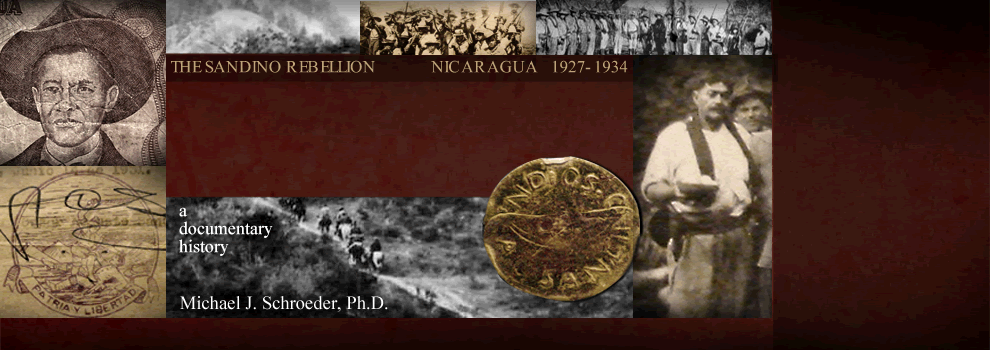|
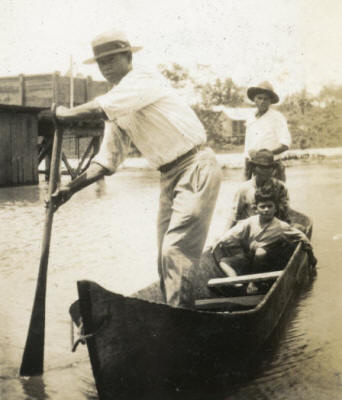 THIS IS THE SECOND PAGE OF
DOCUMENTS FOR THE PERIOD THROUGH 1927
on Nicaragua's Caribbean Coast region, housing
materials dated in the 111 days from December 10, 1926
to March 30, 1927, during the height of the 1926-27
Civil War.
THIS IS THE SECOND PAGE OF
DOCUMENTS FOR THE PERIOD THROUGH 1927
on Nicaragua's Caribbean Coast region, housing
materials dated in the 111 days from December 10, 1926
to March 30, 1927, during the height of the 1926-27
Civil War.
There are some fascinating &
revealing documents here —
starting with the first two, both
letters of protest by medical
doctors in Bluefields to the US
Naval Forces Ashore. The
following letter from the owner of
Neptune Mine B. C. Warnick to
Liberal constitutional president
Juan B. Sacasa offers a fascinating
chronicle of depredations at the
mine by both sides — an interesting
precursor to Sandino's depredations
at the mine more than a year later.
Meanwhile, as the mahogany
companies cry out for the
USA to extend its neutral zone to
protect their business interests,
the daily reports of the US naval
forces ashore from early January
offer glimpses of the comings &
goings of the Liberal & Conservative
forces. The case of Bluefields
businessman Leon Franks is
noteworthy for his vigorous
insistence on his legal rights
before both the Nicaraguan and US
governments (15 & 17 Jan., 5 Feb.,
30 March). Suggesting both the
the precarious position of
Nicaraguan exports in the global
mahogany market and the disruptions
of war is the 11 Feb. report by J.
C. Nellis on "unfavorable mahogany
prospects in Nicaragua." The
March 30 radiogram from the mahogany
companies suggests the depths to
which President Díaz was beholden to
US business interests, while the
letter from Moravian missionary
Guido Grossman offers revealing
observations about war-imposed
scarcities among the "Tasba pouni
people" near Pearl Lagoon.
Also
included are four documents
from Sandino's oeuvre on his 40-day
Civil War journey from Las Segovias
to the Coast & back (located
chronologically on 1 January 1927),
accompanied by an ancillary webpage,
HERE,
exploring four different accounts of
how his small band acquires arms
near Puerto Cabezas in early January
1927 and who, exactly, helps him.
|
|
PERIOD MAPS
|
|
1894 mosquito
shore

27 MB,
library of congress
|
1920s
Standard Fruit

6.5 mb,
US National archives
|
1928 Rio wanks
Patrol

3 mb, us
national archives
|
1931 Moravian

2.4 mb,
comenius press
|
|
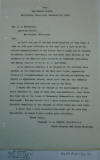
|
10 December
1926.
Letter from C. E.
Nelson, M.D., The Nelson Clinic,
Bluefields, to US Consul A. J.
McConnico, Bluefields.
"As the
Chief Surgeon of the Red Cross Hospital
of this city, I wish to call your
attention to the fact that I have never
received acknowledgement of the letter
that I asked you to forward to Admiral
Latimer concerning the treatment that
certain of the patients of our Hospital
have received by Commander Richardson
and Ensign Schlief of the U.S.S.
GALVESTON. ¶ As an American citizen, I
am ashamed of the attitude that certain
of the officials of our Navy have taken,
apparently because of strongheadedness
or from the effects of imbibing too
freely of spiritous drinks, which have
been far too commonly seen among
officers and enlisted men of our Navy. I
might add that as the result of the
imprisonment of men above referred to,
some of whom were non-combatants, that
there have one or two cases of Pulmonary
Tuberculosis that have developed. You
may recall that I ahve called attention
to the horrible condition of the prisons
in which these men were kept. ¶ I trust
that a fair investigation might yet be
made into the matter, to which I have
called your attention. ¶ Yours truly, .
. . "
|
|
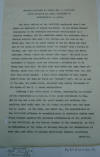
|
1. 18 December 1926.
Written Statement of
Dr. John L. Marchand, M.D.,
Bluefields, referring to Lt. H. M.
McGee, to US Consul A. J. McConnico,
Bluefields, p. 1.
"WRITTEN
STATEMENT OF DOCTOR JNO. L. MARCHAND, ¶
DATED DECEMBER 18, 1926, REFERRING TO ¶
LIEUTENANT H. M. MCGEE. ¶ The first
officer of the GALVESTON contingent whom
I saw under the influence of liquor was
McGee. He was making himself conspicuous
in the principal mercantile
establishment on a Saturday evening, and
his condition evoked the statement from
a British subject with whom I was
talking and who told me who McGee was,
that it was quite common to see him
drunk and that any of the American
officers could “be bought” with a bottle
of whiskey, and that if a fellow had two
bottles they, the Naval officers, “would
follow him around like dogs.” He cited
to me several instances when McGee and
other officers were under the influence
of liquor; upon one occasion a revolver
had to be taken away from him. He also
said that McGee and some other officers,
would stay with you as long as your
bottle held out, but that they never
bought. I have often wondered if this
remark didn’t reach the ears of those
who “wouldn’t buy”, for he is one of the
men, who weeks later, received very
scurvy treatment at the hands of the U.
S. Naval authorities. ¶ Although I had
often heard of McGee, principally on
account of his reputation as a boozer, I
was never introduced to him. But he was
not a man with the quiet manner and
retiring disposition that would make for
his being forgotten once one knew him by
sight. At the time, one might say, the
proclivities of the GALVESTON officers
to overindulgence in alcoholic drinks
were being weighed against the previous
performance of the officers of the
GALVESTON, by the better element of
community, so that no infraction of the
rules of decency escaped the observation
of some one, and often of persons
unfriendly towards everything ¶
American, . . ."
|
|
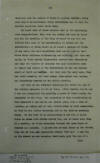
|
2. 18 December 1926.
Written Statement of
Dr. John L. Marchand, M.D.,
Bluefields, referring to Lt. H. M.
McGee, to US Consul A. J. McConnico,
Bluefields, p. 2.
" . . .
American, and the number of these is
growing rapidly, whose only object in
mentioning these infractions was to twit
the natural Americans about their Navy.
¶ No doubt some of these stories told by
the unfriendly were exaggerations, but,
even so, enough was seen by those who
had the prestige of the Navy at heart to
lay even the wildest tale open to the
possibility, if indeed not the
probability, of being built on at least
a medium of truth. At any rate, the most
charitable that can be said is that
these Naval officers deliberately and
willfully, and time and again, by their
openly disgraceful conduct made
themselves not only the targets of
ridicule but laid themselves open to
almost any charge of the infraction of
the law and decency short of theft and
murder. And they were the only ones,
they and their cronies, who were immune
from arrest for drunken and disorderly
conduct on the public streets. ¶ And
from my own personal knowledge Lt. McGee
was one of the shining examples of all
of this. After knowing who he was I saw
and recognized him probably a score of
times during the remainder of his stay.
The summation of this recollection is
that whanever I saw him he was either
going into a club or cantina, or coming
out of one, either alone or with
companions, or that he was either
extremely red in the face or probably
drunk. To the best of my recollection I
saw him at least twice in clubs with
drinks before him, and at least once
thus in a cantina, on these occasions
through the open doors or windows as I
passed. I passed him several times on
the street, very red of face and
apparently mildly “lit up;” I saw him on
the street on one occasion familiarly
grab the arm of a ¶ lady . . ."
|
|
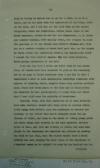
|
3. 18 December 1926.
Written Statement of
Dr. John L. Marchand, M.D.,
Bluefields, referring to Lt. H. M.
McGee, to US Consul A. J. McConnico,
Bluefields, p. 3.
" . . .
lady in trying to induce her to go for a
walk, or go to a dance, and he had more
than the appearance of not being sober
at the time, and I saw him for the last
time on the street staggering drunk and
boisterous, within plain sight of the
Naval barracks, whence he and his two
companions, S. H. Baker and Arnoldo
Calonje, both equally drunk, had stopped
to argue the question as to who should
wear McGee’s Stetson hat. This was on a
certain evening at about half past six,
on the corner of Reyes Avenue and
Commercial Street; and immediately after
I passed the trio started towards the
Red Cross Hospital, Baker having
possession of that hat. ¶ I do not say
that I never saw McGee when he was
sober. This, of course, must have
occurred to give me that contrast, but
as so many of these occasions when I saw
him in what I considered a more or less
intoxicated condition coincided with
reports of drinking bouts, reports twice
from another participant, which had
taken place at the time and in which
McGee was reported to have participated,
I cannot help but think that I was right
upon the majority of occasions. ¶
Equally, then, with this knowledge it is
only naturally that some credence should
have been given to stories circulated
among who McGee’s name was mentioned on
several occasions, to the effect that
Naval officers under the influence of
drink, had been in the habit of taking
young girls for walks along dark streets
in the more sparsely settled parts of
town, and that one father, at least,
have made complaint to the Commander who
punished one officer by sending him back
to his ship, when the custom ended; that
a Naval officer was seen jumping the
back fence of the residence of a married
woman so he wouldn’t be seen by her
husband who had ¶ returned . . ."
|
|
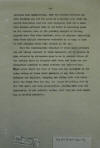
|
4. 18 December 1926.
Written Statement of
Dr. John L. Marchand, M.D.,
Bluefields, referring to Lt. H. M.
McGee, to US Consul A. J. McConnico,
Bluefields, p. 4.
" . . .
returned home unexpectedly; that two
drunken officers had been forcibly put
off the porch by a husband upon their
repeated insistence that his wife
accompany them for a walk; that drunken
officers were in the habit of accosting
girls on the streets, much the grinning
delight of loafing negroes when they
were repulsed, etc., ad nauseum -
especially when these alleged occurences
coincided as so many of them to with
drinking bouts held earlier in the day.
¶ That the reprehensible behavior of
these Naval officers was not solely
confined to their excessive use of
alcohol is also attested by statements
made to me by several others of the
landing force in barracks with them, and
these are not altogether confined to
petty officers and enlisted men. Night
after night the rest of these men was
disturbed by the noisy return of these
night prowlers at any time between
midnight and daylight, laughing and
joking with each other about the risks
they had run, the danger of getting shot
by the "old man", and such pleasantries,
leaving very much the impression, if not
actually saying, that they had been
poaching on martial [marital]
preserves."
|
|
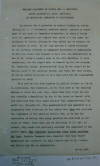
|
18 December
1926.
Written Statement of
Dr. John L.
Marchand, M.D., Bluefields,
referring to Lt. Commander W. N.
Richardson, to US Consul A. J.
McConnico, Bluefields, p. 1.
"WRITTEN
STATEMENT OF DOCTOR JNO. L. MARCHAND, ¶
DATED DECEMBER 18,1926, REFERRING ¶ TO
LIEUTENANT COMMANDER W.N. RICHARDSON. ¶
On October 8th I protested to Admiral
Latimer by letter, through Mr. A. J.
McConnico, American Consul, against my
treatment at the hands of Commander
Richardson, in which I stated that his
appearance and conduct were those of a
man under the influence of liquor,
putting it very mildly out of respect
for the uniform he wore. In the same
protest I called attention to the
partisan attitude of Commander
Richardson as exemplified in which has
since been learned to have been the
substitution by him of Dr. Arana’s
report, made to the Jefe Politico, of
jail conditions, for the report made to
himself by his own surgeon, Lt.
Commander Crooks, substantiated fully by
the report of Dr. Nelson, made to the
America Consul; and that, for this
reason, if for no other, he seemed to be
a man unfit for the responsible position
he held. ¶ This protest has been ignored
by Admiral Latimer as far as I,
personally, was concerned, as was that
made by the hospital matron at about the
same time, other than that their receipt
was verbally acknowledged by him to the
American Consul, with the statement that
they would receive “due consideration.”
Up until now, December 18, “due
consideration” has amounted to a
flippantly made statement to the effect
that they had received the complaint of
the American doctor, but, as he had the
reputation of having lost every position
he ever held on account of drink, they
would pay no attention to it, and, of
course, they would not seriously
consider the complaint of the native
woman, for Commander Richardson never
drank anything but beer. Captain
Townsend also remarked that they didn’t
understand the reference to jail reports
and to Dr. Crooks, nor did he ask for an
explanation. ¶ As my past . . ."
|
|
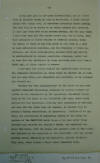
|
18 December
1926.
Written Statement of
Dr. John L.
Marchand, M.D., Bluefields,
referring to Lt. Commander W. N.
Richardson, to US Consul A. J.
McConnico, Bluefields, p. 2.
"
. . . As my past life is not under
investigation, and as I have held no
position during my stay in Bluefields, I
shall content myself with saying that,
if Commander Richardson drinks nothing
but beer this is no answer to my charge
against him; moreover, it must have been
beer of an extremely potency, for the
only times I have ever seen him with
drinks before him, two or three, they
were contained in either whiskey or
cocktail glasses; while the number of
times he has been noted to have been in
more or less intoxicated condition, and
the frequency of these occurrences, and
their noticeability, matters which can
readily be substantiated by several
creditable witnesses, would tend to show
that his indulgence in these potations
must have been a habit and, at times
carried to excess. ¶ I now make the
charge without any qualifications
whatever; Lt. Commander Richardson was
drunk while in uniform and on duty, and
not only drunk, but disorderly and
insultingly, in my presence and towards
me. ¶ Whether the “due consideration” of
the above two protests against Commander
Richardson, promised by Admiral Latimer
included or was consummated by the
apparently convenient breakdowns of the
ice plant on the GALVERSTON, his ship,
which would necessitate her departure,
with her full complement of officers and
men, for the Canal Zone for repairs, or
whether this is merely a timely
coincidence, is immaterial. Suffice it
to say that, the circulation of
persisting rumors of the early
departure, the circulation of persisting
rumors of the early departure of the
GALVESTON which began a few days after
these protests had reached the Admiral’s
hands, and continued for about two
weeks, with one reason and another given
as the cause, was followed by the
departure of the GALVESTON, with its
entire landing force, relieved by the
ROCHESTER, Admiral Latimer’s flag ship,
which landed a force under Commander
Ertz."
|
|
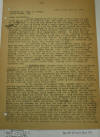
|
1. 22 December 1926.
Letter from
Benjamin C. Warnick, Neptune
Mine, to President Dr. Juan B. Sacasa,
Puerto Cabezas, p. 1.
[NOTE:
This is a fascinating letter & appeal —
at one level, a chronicle of repeated
depredations by mostly Conservative
armies from September to December 1927,
with total losses estimated at nearly
$4,000. Predictably, the Neptune Mine &
the mining districts had become a source
of capital for mobilized armies well
before Sandino arrived on the scene.
Warnick also emphasizes "the minds of
our workmen" and their presumptive
exemption from military service.
Especially noteworthy are the copies of
guarantees and receipts from various
military leaders that accompany
Warnick's letter to Sacasa, pp. 3-4,
below.]
"Señor
Presidente: ¶ Having understood that you
spent several years of your youth in our
City of Brotherly Love, and since our
interests are more or less the common, I
bring your notice to the following facts
and confirm some in part by copies which
I would appreciate if you will their [?]
approve, in order to set at rest the
minds of our workmen that they may give
their undivided attention to their
responsibilities and not be troubled by
intimations of forced military service
and other military demands. Sufficient
are these annoyances, however, to cause
them to absent themselves from our work
for days at a time, seriously
interfering with our mine and mill
operation, which must be continuous to
be self supporting. I trust you will
bear with me and lend me your
cooperation, as I herein request,
feeling more that any courtesy you
extend me, like bread cast upon the
water, will reflect back to you. ¶ On
September 17th, I was intercepted at
Tunky, Nic., and held prisoner without
cause by Manuel Arroliga, el general en
jefe de esta zona, and was sent as
prisoner to Bragman Bluff in custody of
Coronel Luis Arroliga and Mr. John
Gabriel, after I had agreed to extend
General Arroliga every courtesy while on
his journey through our mining section,
and to pay him the sum of five hundred
dollars ($500.00) which I caused to be
paid as agreed to General Luis Arroliga
at Puerto Cabezas, Nic., General
Arroliga collected, in supplies from our
commissary to the sum of thee hundred
and twenty five (325) dollars, upon his
arrival at Neptune Mine, September 8th,
leaving there afternoon of September
9th. ¶ On November 12th, Coronel Ramon
Gradis made his appearance leaving
November 17th with cash orders amounting
to fourteen hundred and ninety eight
dollars ($1498) and some cattle, using
our supplies to the extent of fifty
dollars ($50). On December 18th, Coronel
Francisco Gonzales comission por
delegacion del Ministro de la Guerra y
Acuerdo del senor Presidente Juan. B.
Sacasa, arrived at mine and left
December 18th, taking with him fifty
four men and cash orders amounting to
six hundred dollars and seventy eight
cents ($678) consuming supplies of the
value of about fifty dollars ($50). ¶ On
the morning of December 19th, Rodolfo
Dorn B. el jefe militar expedicionario
arrived, demanding either men or money
and left December 21st, with cash orders
amounting to seven hundred and nine
dollars ($709), making a total received
from this company and men guaranteed by
the mine of thirty eight hundred and ten
($3810) dollars at a time when we least
can afford this expenditure. Each
military official in turn made the men
promises as to their exemption from
military service but each of them caused
considerable unrest, while their
promises were more or less complied
with, exemptions justifiable to me were
made, but which gave our workmen the
idea that the word of the officer
representing the Liberal Government
could not be depended upon, especially
to their exception from military
service. I assured them in writing and
in person that the boleta executed to
them individually by officer Dorn and
herein made a part of my data submitted
would be recognized by every succeeding
officer, who might visit Neptune. Our
fixed charge outside of interest charges
are something like fifty ($50) per hour,
we have lost in operation several
thousand dollars through the closing
down of the mines due to the arrival of
your soldiers and the unrest they have
created, to . . . "
|
|
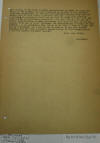
|
2. 22 December 1926.
Letter from
Benjamin C. Warnick, Neptune
Mine, to President Dr. Juan B. Sacasa,
Puerto Cabezas, p. 2.
". . . men running to the bush to evade
conscription. In order to allay the
fears of the workmen and give assurance
to us that we may continue operation
unmolested, we ask that you authenticate
over your own signature copy of data
which I herewith send you, and such
other of assurances of protection which
you may have to offer us, that will not
only aid me in maintaining operation,
but will inspire the men to a better
understanding of your government that
they may more freely cooperate with you
by their influence and contributions in
behalf of your efforts. I am entrusting
this letter to Mr. Juan. G. Rizo of
Tunky, who has my confidence and I ask
of you to send me by him your answer.
Thank you for your favorable
consideration of this communication I am
with kindest personal regards, ¶ Yours
very truly, ¶ President."
|
|
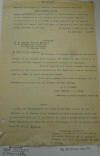
|
3. 22 December 1926.
Letter from
Benjamin C. Warnick, Neptune
Mine, to President Dr. Juan B. Sacasa,
Puerto Cabezas, p. 3.
"COPY OF DATA ¶ Received by Benjamin C.
Warnick, President Bonanza Mines Co. ¶
from military source ¶ Concedo pasaporte
al señor Benjamin C. Warnick a quien
recomiendo a las autoridades de este
Litoral, que se los guarde todo las
consideraciones y se le preste el apoyo
necesario que van bajo la custodia del
Coronel Luis Arolliga y el capitán del
bote John Gabriel. ¶ Tunky Septiembre 7,
de 1926 ¶ El general en jefe de esta
Zona ¶ M. Arolliga. (sello) ¶¶ Commander
¶ U. S. Special Service Squadron ¶
U.S.S. Rochester, Flagship ¶ Bluefields,
Nicaragua. ¶ 30 October 1926. ¶ To whom
it may concern: ¶ Mr. Benjamin C.
Warnick, President and General Manager
of the Bonanza Mines Company, the bearer
of this letter is an American citizen
engaged in legitimate business in
Nicaragua. ¶ General Arguello and
General Moncada have both assured me
that American business on this Coast
will not be interfered with by either of
their respective forces. ¶ It is to be
trusted that this assurance will be
honored and respected by all members of
both forces. ¶ J. L. Latimer. ¶ Rear
Admiral U. S. Navy ¶ Commander Special
Service Squadron. ¶¶ Aviso. ¶ A todos
los trabajadores que están en servicio
actual de los trabajos de la Bonanza
Mines Company que tienen guarantía tanto
por mi autoridad como por el Presidente
Sr. Juan B. Sacasa quien me recomienda
especialmente para que no se interrumpen
el nos trabajos y plantales de la Mina
Neptune. ¶ Francisco González ¶ Coronel
en comisión por delegación del señor
Ministro de la Guerra y acuerdo del
señor Presidente Dr. Juan B. Sacasa."
|
|
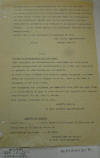
|
4. 22 December 1926.
Letter from
Benjamin C. Warnick, Neptune
Mine, to President Dr. Juan B. Sacasa,
Puerto Cabezas, p. 4.
"Rodolfo Dorn B. en representación del
2d. Jefe del Ejército, General Federico
Guillermo Messer, hace constar que
quedan exentos [exempted] del servicio
miliar veinte indios Mosquitos de
diferentes apellidos lo mismo quedan
exentos como los ochentai nueve (89)
trabajadores que con cinco pesos ($5.00)
cada uno han contribuido y que son
extrinctamente necesarios a los trabajos
de la Empresa Bonanza Mines Company ...
/s/ Rodolfo Dorn B., Jefe Militar
Expedicionario [Sello]"
[NOTE: From this we learn that some 20
Miskitu Indians and 89 other workers
comprised the labor force at Neptune
Mine; evidently the Miskitu did not have
to pay the $5 "contribution" to receive
their military exemption.
|
|

|
1. 1
January 1927.
Selected published narratives of
Gen. A. C.
Sandino in the Atlantic Coast
during the Civil War, ca. 24 Dec. 1926 -
2 Feb. 1927.
"La Guerra
Constitutionalista,"
El pensamiento vivo,
Sergio Ramírez, ed. (Managua: Nueva
Nicaragua, 1984), v. 1, pp. 82-83.
[NOTE:
These are Sandino's most expansive
narratives of his time on the Atlantic
Coast during the 1926-27 Civil War. The
date of 1 January 1927 is approximate,
but his first meeting with Moncada was
sometime in early January, around the
time his forces retrieved arms &
ammunition from somewhere, with the help
of someone — in version #1, unspecified;
in version #2, "un grupo de muchachas de
amores libres"; and in version #3 (his
1933 interview with José Román),
"Segovian prostitutes". There are also
at least two other versions. Which is
"correct"? It is impossible to know with
certainty, but my own view is that the
1933 interview with José Román is the
most detailed, specific & credible, for
reasons examined on a separate page,
HERE.
The present version I call
Version #1.
It does not say anything about who
helped his small force retrieve the 40
rifles and 7,000 bullets; nor does it
say they were retrieved from the sea. It
does say that after they were retrieved,
"some natives of the Mosquito Coast"
helped to transport them overland to
Prinzapolka:]
"... El 24 de
diciembre de 1926, los yankees
declararon Zona Neutral Puerto Cabezas,
ordenando al Doctor Sacasa la evacuación
del Puerto en el término de cuarenta y
ocho horas por todo el Ejército
Constitucionalista y el retiro de
elementos bélicos nicaragüenses que allí
hubiera. ¶ Al recibir la grosera
intimación procedieron a desocupar
aquella plaza los constitucionalistas,
en el escaso tiempo de la intimación. ¶
No pudiendo llevar todos los
elementos bélicos almacenados alli, gran
cantidad de ellos fue arrojada al mar
por los yankees. La desesperante
humillación dio lugar a que las fuerzas
de Sacasa dejaran abandonados cuarenta
rifles y siete mil cartuchos sobre la
raya de costa entre Puerto Cabezas y
Prinzapolka. ¶ Mis seis ayudantes y yo
no quisimos dar un paso sin llevar con
nosotros los elementos abandonados. ¶
Con la ayuda de algunos nativos de La
Mosquitia transportamos por tierra a
Prinzapolka aquellas armas y el parque.
..." [my emphasis]
|
|
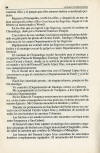
|
2. 1 January 1927.
Selected published narratives of
Gen.A. C. Sandino
in the Atlantic Coast during the Civil
War, ca. 24 Dec. 1926 - 2 Feb. 1927.
"La Guerra
Constitutionalista,"
El pensamiento vivo,
v. 1, p. 84.
[NOTE:
Continuation of Version #1.]
|
|
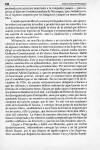
|
3. 1 January 1927.
Selected published narratives of
Gen. A. C.
Sandino in the Atlantic Coast
during the Civil War, ca. 24 Dec. 1926 -
2 Feb. 1927.
"Para la historia
de Nicaragua," El pensamiento
vivo, v. 2, p. 238.
[NOTE:
This is what I call
Version #2:
". . . Yo salí con seis ayudantes
atrás de la Guardia de Sacasa, y conmigo
iba un grupo de muchachas de
amores libres, ayudandonos a sacar
hasta la distancia impuesta por los
invasores, rifles y parque,
que fueron en número de treinta
rifles y seite mil cartuchos."
[my emphasis]
|
|
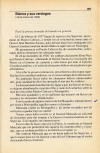
|
4. 1 January 1927.
Selected published narratives of
Gen. A. C.
Sandino in the Atlantic Coast
during the Civil War, ca. 24 Dec. 1926 -
2 Feb. 1927.
"Blanca y sus
verdugos," El pensamiento
vivo, v. 2, p. 387.
[NOTE:
This narrative is
identical to Version #1.]
|
|
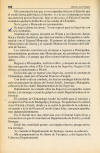
|
5. 1 January 1927.
Selected published narratives of
Gen. A. C.
Sandino in the Atlantic Coast
during the Civil War, ca. 24 Dec. 1926 -
2 Feb. 1927.
"Blanca y sus
verdugos," El pensamiento
vivo, v. 2, p. 388.
[NOTE:
Continuation of above,
identical to Version #1.]
|
|

|
6. 1 January 1927.
Selected published narratives of
Gen. A. C.
Sandino in the Atlantic Coast
during the Civil War, ca. 24 Dec. 1926 -
2 Feb. 1927. Excerpt from
José Román,
Maldito país (Managua:
Amerrisque, 2007), pp. 88-89.
[NOTE:
This Version #3 seems to me the most
credible of Sandino's three narratives.
For a more detailed discussion, see Page
11 of the Documentary Annex to these
East Coast pages,
HERE.]
"... Moncada me
negó las armas que tanto necesitamos.
Como los norteamericanos declararan a
Puerto Cabezas "Zona Neutral," el
Gobierno de Sacasa tuvo que moverse a
Prinzapolka. En Puerto Cabezas
quedaron rifles y ametralladoras
escondidas para que no los capturaran
los marinos. Estas armas me fueron
"entregadas" secretamente por
unas prostitutas de esa ciudad
que sabían donde estaban escondidas
y por suerte eran segovianas.
Con mis ayudantes y ese grupo de
segovianas de la vida pública,
logramos sacar los rifles, dos
ametralladoras y poco más de 37,000
cartuchos. Todo nuevo. Esto
además de unos pocos rifles viejos y
quebrados que nos dieron los del
Gobierno y de los cuales apenas uno que
otro sirvió. Bueno, en total permanecí
cuarenta días en la Costa Atlántica.
..." [my emphasis]
|
|
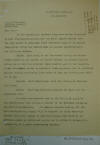
|
1 January
1927.
Letter from The
Mengel Company, Otis Manufacturing
Company, The Freiberg Mahogany Company,
the Nicaragua Mahogany Company, and the
S. B. Vrooman Company Ltd., to US
Consul A. J. McConnico, Bluefields, p.
1. "We
the undersigned American Companies
having interests at Cape Gracias, Wawa,
Prinsapolca and Pearl Lagoon believe
that the only manner to safeguard these
interests would be to include these
Ports within the Neutral Zone as already
established, for the following reasons:
¶ First: That owing to our Government
having established Neutral Zones in Rio
Grande and Puerto Cabezas and Admiral
Latimer having stated that the Forestal
Taxes shall be paid to the
Constitutional Government headed by
President Diaz, reprisals will be
practiced against us, such as, cutting
loose rafts of logs and letting some
drift out to sea. ¶ Second: That
interference with the loading of
steamers will occur. ¶ Third: That Tug
Boats, and supplies for same will be
interfered with. ¶ We state one concrete
case of the taking of supplies and
interference with loading a steamer by
the Liberals occupying the Port of
Prinsapolca. The Steamer Muneric loading
for the Otis Manufacturing Company will
be delayed and heavy demurrage incurred
thru their supply of Gasoline having
been taken by the Liberals, unless an
additional supply can be gotten to
Prinsapolca immediately at a great
unnecessary expense."
|
|
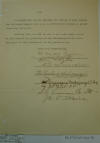
|
1 January
1927.
Letter from The
Mengel Company, Otis Manufacturing
Company, The Freiberg Mahogany Company,
the Nicaragua Mahogany Company, and the
S. B. Vrooman Company Ltd., to US
Consul A. J. McConnico, Bluefields, p.
2. "
. . . Trusting that you will be able to
get some prompt action on this request
for protection of our interests, from
Our State Department or Naval Forces now
on the ground, . . . /s/ The Mengel
Company [illegible] ¶ Otis Mfg. Co. /s/
D. S. Wueslier [?] ¶ The Freiberg
Mahogany Company /s/ [illegible] ¶
Nicaragua Mahogany Company Ltd. /s/
[illegible] ¶ S. B. Vrooman Co. /s/ J.
E. Williams"
|
|
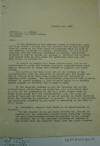
|
2 January
1927.
Letter from
Nicaragua Mahogany Company,
Bluefields, to Admiral J. L. Latimer, in
Command U.S. Naval Forces, Nicaragua, p.
1.
"Sir:- ¶ We
are informed by the American Consul at
Bluefields that you have issued ruling
that the forestall tax on logs exported
from all ports on the East Coast of
Nicaragua shall be paid to the American
Collector of customs, Bluefields. We are
further informed that the American
Collector of Customs, Bluefields,
proposes to hold us liable for payment
of forestall tax in every case except
when we have asked for protection from
you, but have failed to receive it. ¶ We
desire to comply with these
instructions, but we are constrained to
point out certain practical
considerations, which must of necessity
be taken into account in applying the
above ruling. ¶ All ports on the East
Coast are in the control of the
revolutionists with the exception of the
Bluefields, Rio Grande, and Puerto
Cabezas which have been neutralized and
occupied by the American Naval forces.
The revolutionary authorities have
hitherto refused to permit loading of
logs at ports under their control unless
payment of forestall tax is made to
them. ¶ If the exporter refuses to pay
the forestall tax to the revolutionary
authorities and warns the said
authorities that he will ask the
protection of the U.S. Naval Forces
there is every probability that the
revolutionists will cut loose the rafts
of logs and let them go to sea or
indulge in other reprisals which the
exporter is powerless to prevent. In
such an eventuality any assistance
rendered by you would of necessity be
too late to be of value. ¶ We, therefore
suggest that there be an understanding
as follows: ¶ “In the absence of an
agreement between the admiral in command
and the competent revolutionary
authority whereby the said revolutionary
authority consents to the payment of
forestall tax to the American Collector
of Customs at Bluefields that exporter
shall have the right whenever . . ."
|
|

|
2 January
1927.
Letter from
Nicaragua Mahogany Company,
Bluefields, to Admiral J. L. Latimer, in
Command U.S. Naval Forces, Nicaragua, p.
2.
" . . . necessary to pay the
forestall tax to the de facto
authorities except at ports where the
U.S. Naval Forces are in position to
extend adequate protection to the
exporter and prevent the application of
duress to labor necessary to load prior
to time of exportation.” ¶ Very
respectfully ¶ Nicaragua Mahogany
Company, INC."
|
|
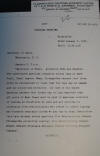
|
2 January
1927.
Memorandum on Atlantic Coast businesses,
US Consul A. J.
McConnico, Bluefields, to
Secretary of State, Washington D.C.
(USDS 317.115 Ot 4/13) "Secretary
of State. ¶ Attention Olds and Stabler.
¶ The undersigned American companies
having logs at Cape Grail, Pearl Lagoon,
Wawa, Prinzapolka request that these
ports be neutralized in order that the
logs may be loaded and our properties
protected In view of the recent decision
Latimer that forest tax on logs exported
from all ports of East Coast must be
paid to American collector of Customs at
Bluefields we need and are entitled to
protection from revolutionists who
refuse to permit loading and threaten
reprisals unless we pay tax to them.
Revolutionists have already seized
gasoline Otis Manufacturing Company
Mengel Company Nicaragua Mahogany
Company Frieburg Mahogany Company."
|
|
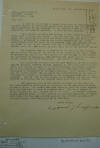
|
10 January
1927.
Letter from
Osmond Thompson, Bluefields, to
US Consul A. J. McConnico, Bluefields.
"Dear
Sir: ¶ I find it necessary to place
before you the following facts because
neither my consul nor myself have
obtained any satisfaction after
appealing to the Commander of the
Landing forces of the U.S.S. Galveston,
and Admiral Latimer. I am British
subject. ¶ The Schooner Atlantic was
wrecked on this coast 38 miles north
coast of Bluefields Bluff. She was
insured. The underwriters Agent, Mr.
Thos. W. Waters, sold the wreck to me
and gave me a valid title. I proceeded
to rebuild the vessel, renamed her the
“Seven Stars”, registered her under the
Nicaraguan flag, and operated her in the
trade on this coast between here and
Puerto Cabezas for ten months, when she
was seized by Louis Coe, one of the
previous owners. ¶ The Schooner was in
litigation at the time she was wrecked,
and the court had placed the vessel in
the hands of one Carlos Pasos as
Depository, and was working her for the
benefit of the owners. The insurance was
$6,000.00, the Underwriters agent paid
to the said Carlos Pasos, the court
appointee. My title is absolute. ¶ The
political troubles here brought about an
agreement before Admiral Latimer,
between General Arguello of the
Conservative Government, and the General
Moncada of the Constitutional
Government. Article #7 of this agreement
states clearly neither side shall use
boats belonging to foreigners or foreign
companies. Coe’s object in seizing the
“Seven Stars” was to permit the
Conservatives to use her. I protested to
Commander Richardson of the U.S.S.
Galveston and to the Admiral. So did the
British Consul in my behalf, and all the
satisfaction we received was the Admiral
would look into the matter. ¶ The
Admiral permits the vessel to remain in
the hands of the Conservatives
Government in violation of the agreement
to which he was a party. The vessel has
been taken up into the river between
here and Rama and is and is used as a
Man-of-War. She is in danger of being
attacked by the Liberals and to be sunk.
I protested energetically against action
of the Admiral in not insisting that the
agreement signed by himself- General
Arguello and General Moncada, protesting
foreign floating property be observed."
|
|
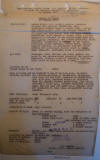
|
10 January
1927.
Record of Events,
Lt. Col. J. Meade, USS Argonne,
Bluefields (p. 1 only).
Reports on US
troop movements & strength on Atlantic
Coast; 400 troops (17 officers & 383
enlisted, including Navy personnel).
|
|
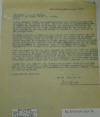
|
11 January
1927.
Letter from Wo
Hing and Company, Cukra Hill near
Pearl Lagoon, to US Consul A. J.
McConnico, Bluefields, p. 1.
"I
Hing Ching, of lawful age, married,
merchant and of this domicile and
principal of the firm of Wo Hing and Co.
of Cukra Hill, respectfully beg to
submit the following claim against the
Nicaraguan Government for damage
sustained by the armed forces operating
in the district of Pearl Lagoon and its
vicinity during the months of August 1st
up to the present date. ¶ My store
situated at Cukra has been sacked and
looted besides the different merchandise
taking therefrom without my consent and
in return I received a receipt from the
troops and at times none. Herewith find
eleven vouchers or receipts for goods
numbered from 1 to 11, the eleventh is
the last voucher obtained from general
Luis Zelaya, one of the expeditionary
chiefs, who commanded some of the
government forces at Pearl Lagoon. This
last receipt fully proves my assertion
of looting. ¶ From the appended list you
will clearly see that I have lost ONE
TEHOUSAND and TWENTY DOLLARS AND
FORTYFIVE CENTS AMERICAN GOLD in cash
and merchandise besides my clothing to
the value of TWO HUNDRED DOLLARS, which
makes a total of TWENVE HUNDRED AND
TWENTY DOLLARS and FORTFIVE CENTS GOLD
for which I respectfully claim said
amount I hope that you will see that
Imobtain [sic] for my losses. ¶ Hoping
that you will see the justness of my
case which has not only put me out of
business in the district of Cukra
temporarily but has hindered me from
gaining my livelihood and accrued
profits I obtained from my business. ¶
Respectfully submitted,"
|
|
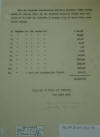
|
11 January
1927.
Letter from Wo
Hing and Company, Cukra Hill near
Pearl Lagoon, to US Consul A. J.
McConnico, Bluefields, p. 2.
"List of Vouchers representing articles
forcibly taken during the month of
August, 1926, by the Chamorro military
troops from the store of Wo Hing and
Company, a Chinese firm at Cukra Hill,
near Pearl Lagoon. ¶ Voucher amounts of
$18.00, $19.95, $12.00, $3.00, $0.60,
$7.00, $40.00, $129.00, $195.00,
$100.00, $495.00. Totaling $1,020.45"
|
|
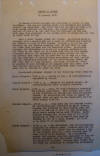
|
11 January
1927.
Record of Events,
Lt. Col. J. Meade, USS Argonne,
Bluefields, p. 1. "At
twelve o’clock midnight the embarking of
troops on tugs continued. The seas was
running heavy, but embarking was handled
without any accidents. The first tug
left the ship at 1:20 A. M. with eleven
officers and 163 men. The second tug
completed loading at 2:30 A. M. And left
with six officers and 182 men. Both tugs
then proceeded to the customhouse at
Bluefields and tied up until break of
day. ¶ Here a motor launch joined the
forces. Lieutenant Ralph C. Alburger
with a machine gun and a squad of
riflemen was detailed and ordered to
duty on this launch. At 5:00 A. M. as
day was breaking and the channel
markings over the bar could be seen the
force left for Rama via the Escondido
River. Lieutenant Alburger was
instructed to visit all outposts
encountered on the route up the river
and to inform them that we were making a
neutral zone would not be permitted to
be used as a base for the promotion of
revolutionary operations and that
neither arms nor ammunition destined for
the revolutionary forces nor any other
of army supplies, including provisions,
would be allowed to pass through or be
shipped from this zone, also that
vessels operating with the revolutionary
armed forces would not be allowed to
enter the zone. ¶ Lieutenant Alburger
stopped at the following river outposts:
¶ First Outpost: 7:10 A. M. - Fruita de
Paw - 43 revolutionaries commanded by
Connor. ¶ Second Outpost - 7:30 a.m.
Lomomico (or Monkey Ridge), 26
revolutionaries under Corporal
Cassanova. ¶ Third Outpost - 9:35 A. M.
- Cama, 50 revolutionaries commanded by
general Adam Gomez [Liberal General Adán
Gómez]. This officer felt that he was
justified in taking food from government
forces. He understood our order in
regard to the neutral zone and gave us
the impression that he would comply with
it. ¶ Fourth Outpost- 10:00 A. M. - Camp
Mena (CC and Company Creek), 53
revolutionaries commanded by major
Clement Contone who informed us that
General Mena had left with 200 men on
foot for THE RIVERSIDE, a point about
twenty miles east of Rama. Major Clement
Contone was at the time of our visit
preparing to take his 53 men to Camp
Mena by lighter in tow of a small
launch. At 10:25 A.M. both of us
departed. ¶ Fifth Outpost - 10:55 A.M.
The Riverside, 200 revolutionaries
commanded by General Mena. General Mena
met the patrol officer and stated that
he desired a map of the neutral zone and
a safe conduct pass to come and go as he
pleased. In a courteous manner the
neutral zone was explained to him and he
was informed that the patrol officer
could not grant his request. General
Mena stated that his army was preparing
to attack the government . . . "
|
|
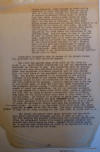
|
11 January
1927.
Record of Events,
Lt. Col. J. Meade, USS Argonne,
Bluefields, p. 2. "
. . . forces tomorrow. When advised he
would not be permitted to enter the
neutral zone he replied that he would
wait outside the neutral limits to the
capture government forces armed or
unarmed when they left. General Mena
wished to know which direction
government troops would leave Rama - to
the sea or interior. General Mena seemed
rather surprised and showed deep concern
as if unsettled in his plans at this
news. He made no comment on river
neutrality. General Mena stated that
supplies for government troops had been
shipped up the river under the
protection of the American Flag. General
Mena in view of the fact we were to
occupy Rama and declare the neutral
zone, suggested that if he could not see
Colonel Meade that he had better see
President Sacasa or the revolutionary
minister of war. General Mena did not
give any information in regard to his
intentions. The general and his staff
were well equipped. Many officers had
field glasses. The rifles of the
revolutionaries at the close quarters
showed lack of care. ¶ Lieutenant
Alburger’s duty in charge of the patrol
forces was performed in a very efficient
manner. ¶ The first tug reached Rama
sixty miles up the river at 12:30 P. M.
Major Clarke disembarked and met the
comandante and explained our mission to
him. The comandante sent for General
Arguella who very soon afterward
arrived. Lieutenant Colonel Meade then
explained to General Arguella that we
were making Rama and both sides of the
Escondido and Sisquia Rivers neutral
zone. The General pretended to be
surprised at our arrival although he had
known of our coming since morning.
General Arguella wanted to know the
authority for our action and if it had
been authorized by Managua. General
Arguella had 1,200 men in and around
Rama, of whom 750 were well armed
including one 180 millimeter French
Cannon, 7 Lewis Guns and about 500, 000
rounds of small arm ammunition. He had
one schooner equipped with gas engine
and a large river motorboat. General
Arguella was told that he would be given
a reasonable time to withdraw from Rama
and the hills with rifle shot of both
sides of the Sisquia River. He decided
to withdraw to Muelle Buey, thence to
San Francisco and Acoyopa via Rama
River. At 1:00 P. M. the motor schooner
with about 25 dugouts in tow and with a
force of about 200 government troops
left Rama and proceeded up the Rama
River. At 4:30 P. M. the large river
motorboat “Sea Lion” Rama departed up
river with 350 men. The power schooner
returned to Rama in the early evening
and the “Sea Lion” at about 8:00 P. M. ¶
The second detachment under Major
Bartlett and the motor boat under
Lieutenant Alburger arrived at Rama at
1:00 P. M. The 77th Machine Gun company
established the outposts immediately
after the government troops with General
Arguella withdraw and patrols were
established in town. Cuyamel Fruit
Company Barge No. 3 arrived from
Bluefields at 11:30 P. M. having met
with no opposition on the way up the
river."
|
|
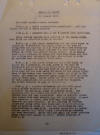
|
13 January
1927.
Record of Events,
Lt. Col. J. Meade, USS Argonne,
Bluefields, p. 1.
"The night passed with incident. ¶ 7:00
A.M. – Radio communication established.
Coil had burned out due to short
circuit. ¶ 7:30 A.M. Launches Nos. 3 and
8 arrived from Providence. ¶ 8:20 A.M. –
2nd Lieut. Cronmiller and one rifle
squad in Launch No. 8 patrolled the
SIQUIA RIVER to the head of navigation
and reported that no troops were seen
during his patrol and that Mr. Draper
informed him that there were no troops
on either the MICO or SIQUIA RIVERS. At
EL MUELLE REAL he was informed no troops
had been seen there and that the natives
were returning to their plantations to
work. He reported back at RAMA at 12:00
noon. ¶ 8:45 A.M. – 2nd Lieut. Brink and
one rifle squad in Launch No. 3
patrolled the RAMA RIVER to the head of
navigation and at 10:10 A.M. found about
150 Federal Soldiers encamped on the
WEST bank of the river six miles above
RAMA and one mile below the mouth of the
IGUANA CREEK. Some of the troops were
leaving in canoes and going up the
river. The gasoline schooner SEVEN STARS
was tied up alongside of their camp.
People along the river were working on
their plantations and gathering fruit
for shipment. The patrol returned to
RAMA at 12:30 P.M. ¶ 9:45 A.M. – Captain
Coffenberg and one rifle squad with a
native telephone repair man in Launch
No. 5 patrolled the ESCONDIDO RIVER to
MAHOGANY CREEK. The telephone line was
tested and found to be in service
between RAMA and SIXA PLANTATION. Test
at MAGNOLIA showed line broken both ways
toward RAMA and BLUEFIELDS. Lineman will
endeavor to patrol line both ways from
MAGNOLIA tomorrow and make repairs. It
was reported by natives questioned along
river that there were no revolutionists
WEST of MAHOGANY CREEK and that all
revolutionists were concentrating at
LOMA-MICO. Personal inspections by
patrol officer showed that three former
revolutionist outposts had been
evacuated. Motor boat RED DEVIL and
motor schooner SEVEN STARS were passed
on river. Patrol returned at 5:00 P.M."
|
|
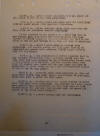
|
13 January
1927.
Record of Events,
Lt. Col. J. Meade, USS Argonne,
Bluefields, p. 2.
|
|
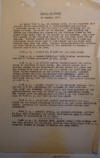
|
14 January
1927.
Record of Events,
Lt. Col. J. Meade, USS Argonne,
Bluefields (p. 1 only).
"At about 7:00 P.M., 13 January 1927, it
was reported that Private First Class
Charles S. Kochersperger was missing. A
thorough search for him was made in
town, vicinity and on barge at dock. He
could not be located. This morning the
search was continued and pieces of his
clothing found on the barge which might
lead to the belief he was drowned. The
river was dragged in the vicinity all
day and his body could not be located.
Further search was made of the town and
a clue was discovered which might lead
to the belief that he might have strayed
away from the town. Further
investigation will continue and when
definite information of his location is
learned a further report will be made. ¶
7:10 A.M. – Launch No. 8 left for the
MICO RIVER. ¶ 7:25 A.M. – Launch
“SUMUWALLA” with lighter containing one
ton of stores proceeded up RAMA RIVER. ¶
1:05 P.M. – An officer patrol
reconnoitered the SIQUIA RIVER to
junction of MICO RIVER. Mr. Draper
stated that Colonel TORRES of the
Government Forces passed his place that
day before with nine of his men in a
canoe and that they had three rifles
concealed in the bottom of the boat.
Colonel TORRES stated that his
destination was COMAYAKA. Fruit is being
collected for shipment all along the
river and women were seen coming from
the river in canoes. The patrol returned
at 1:30 P.M. ¶ 3:15 P.M. – Launch
“YAMNI” of the Mahogany Company, Inc.,
arrived with Mr. BRAUTIGAM who informed
us that both the “SEA LION” and schooner
“SEVEN STARS” had been capture by the
Revolutionists and were at 10:00 A.M. in
SLOOPHOUSE CREEK. The launch left for
MUELLE-REAL at 3:50 P.M. and returned to
RAMA at 7:00 P.M. and tied up for the
night. ¶ 3:30 P.M. – An officer patrol
reconnoitered the RAMA RIVER for six
miles returning at 5:00 P.M. and found
everything quiet. Launches and banana
barges were active during late
afternoon. ¶ 8:50 P.M. – Rudolfo Davila,
an escaped prisoner, arrived in RAMA
this afternoon and stated that General
MENA’S forces intended to concentrate at
LA CRUZ. ¶ 5:30 A.M. 15 January 1927,
Launch “YULA” with lighter and ten days
rations for battalion arrived from
BLUEFIELDS with Q. M. Sergeant Ostrom in
charge of Marine and Navy Guard."
|
|
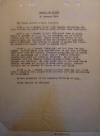
|
15 January
1927.
Record of Events,
Lt. Col. J. Meade, USS Argonne,
Bluefields (p. 1 only).
"The night passed
without incident. ¶ 5:15 A.M. – Launch
“YALU” with lighter containing ten days
rations and guard from EL BLUFF arrived
from BLUEFIELDS. ¶ 8:30 A.M. – Launch
“YALU”, with guard from EL BLUFF, Major
T. Clarke, U.S.M.C., as passenger and an
officer patrol left for EL BLUFF. Major
Clarke had orders to see General MENA
and transmit to him the contents of
COMSPERON Radio 1014-1330. The officer
in charge of patrol had orders to return
with launch “YALU” 16 January 1927. ¶
10:45 A.M. - Launch “SUMUWALLA” arrived
from the RAMA RIVER. Captain Felix Cash
reported that he had been informed that
there were 400 federal troops at
GUADALUPE and he stated that he
personally saw a canoe full of federal
soldiers leaving GUADALUPE and going up
the river. He was also informed that the
federal troops intended moving further
towards the interior. He also stated
that he had seen twenty federal soldiers
at SOLIDAD (9 miles above RAMA). General
ARGUELLO was in command of forces on the
RAMA RIVER ¶ 11:05 A.M. – Launch
“CAMORS” arrived from the RAMA RIVER
with a barge in tow, loaded with 29
cattle and left immediately for
BLUEFIELDS ¶ Rivers patrolled in the
immediate vicinity of RAMA. ¶ RIVER
TRAFFIC ON INCREASE."
|
|
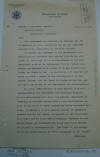
|
1.
15 January 1927.
Letter from
Secretary of State Robert E. Olds,
Washington D.C., to Andrew J.
McConnico, Esquire, American Consul,
Bluefields, re case of Leon Frank, p. 1.
"Sir: ¶ The
Department has received your despatch
No. 197 of December 24, 1926, respecting
the alleged unneutral conduct of Mr.
Leon Frank, an American Citizen. ¶ It
appears that pursuant to the
Department’s instructions you conferred
with Admiral Latimer who submitted to
you a copy of his correspondence to the
Navy Department in which he recommended
that no further protection be extended
to Mr. Frank or to any property the
latter may claim to own. In concluding
your despatch you state you cannot
concur in the recommendation of Rear
Admiral Latimer that Mr. Frank be denied
protection, and you refer the matter to
the Department for determination. ¶ In
giving consideration to Rear Admiral
Latimer’s recommendation the Department
has carefully examined, as you
undoubtedly have also, the several
statements of subordinate officers
transmitted in his confidential report
to the Chief of Naval Operations dated
September 28, 1926. In addition to the
general charges of unneutral conduct
against Mr. Frank, it appears to the
Department that there are at least two
outstanding features of the report
which, if substantiated, would more than
justify the Admiral’s recommendation.
The first is the charge, (which you
characterize as “very damaging” to Mr.
Frank) . . . "
|
|
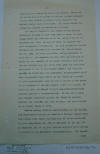
|
2.
15 January 1927.
Letter from
Secretary of State Robert E. Olds,
Washington D.C., to Andrew J.
McConnico, Esquire, American Consul,
Bluefields, re case of Leon Frank, p. 2.
" . . . regarding
the receipt by one of the Liberal
leaders of the letter (which he showed
to Admiral Latimer) alleged to have been
written by Frank, whose signature the
Admiral states that he verifies. Mr.
Frank denies the charge and regards the
matter as a mistake. ¶ The second
feature is the matter of the serious
admissions alleged to have been made by
Frank to Lieutenant McGee and referred
to in the latter’s report of September
14, 1926, (a copy of which is enclosed
for your convenient information). In
this connection the Department has
reviewed your despatch No. 196 of
December 17, 1926, in which you state,
having reference to that part of the
despatch dealing with the donation of
money for the benefit of the rebel
soldiers, that you “do not believe that
Mr. Frank ever made the assertion
attributed to him by Lieutenant McGee,”
and that you “prefer to think that the
Lieutenant misunderstood him.” Your
apparently high regard for Mr. Frank as
a result of your acquaintance with him
for a period of two years is of interest
to the Department, which, of course,
desires to give the weight to your
non-concurrence with Admiral Latimer’s
recommendation. On the other hand, the
charges preferred against Mr. Frank by
Admiral Latimer are specific and very
serious, and are alleged to be widely
known as true. ¶ Before giving further
consideration to the matter, the
Department desires to receive a further
report from you giving such facts (in
addition to those contained in your
despatches No. 196 of December 17 and
No. 197 of December 24) as in your
opinion support your refusal to concur
in the Admiral’s recommendation. The
Department . . . "
|
|
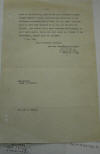
|
3.
15 January 1927.
Letter from
Secretary of State Robert E. Olds,
Washington D.C., to Andrew J.
McConnico, Esquire, American Consul,
Bluefields, re case of Leon Frank, p. 3.
" . . . is
particularly anxious for your comment on
Lieutenant McGee’s report, omitting any
reference to this statement regarding
relief work for the rebel soldiers, said
to have been engaged in by you and the
British Consul. Any events which have
occurred subsequently to your last
report, which you feel would be of help
to the Department, should also be
included. ¶ I am, Sir, ¶ Your obedient
servant, ¶ For the Secretary of State, .
. . "
|
|
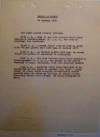
|
16 January
1927.
Record of Events,
Lt. Col. J. Meade, USS Argonne,
Bluefields. "The
night passed without incident. ¶ 8:25
A.M. – Body of the late Private First
Class Charles S. Kochersperger,
U.S.M.C., who died by drowning, was
recovered. ¶ 12:30 P.M. – Launch “YALU”
arrived from EL BLUFF with officer
patrol that left RAMA 14 January 1927. ¶
3:20 P.M. – An officer patrol left RAMA
on launch “YALU” for patrol of ESCONDIDO
to BLUEFIELDS. ¶ 4:00 P.M. – The late
Private First Class Charles S.
Kochersperger, U.S.M.C., was buried in
the native cemetery at RAMA, NICARAGUA,
with full military honors . ¶ 7:00 P.M.
– Received radio from COMSPERON to be
especially on our guard to prevent “SEA
LION”, “SEVEN STARS” or other boats
carrying revolutionary forces passing
RAMA and going up the RAMA or SIQUIA
RIVERS. Necessary orders were issued. No
boats attempted to pass." [NOTE:
According to the
OFFICIAL LIST OF MARINE CORPS CASUALTIES,
PFC Charles S. Kochersperger drowned at
Rama on 13 January 1927.]
|
|
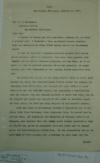
|
1.
17 January 1927.
Letter of protest from
Leon Frank, Bluefields, to US
Consul A. J. McConnico, Bluefields, p.
1. "Dear
Sir: ¶ I desire to advise you that
yesterday, January 14, at about 9
o’clock A.M., I observed a Diaz
government launch removing from her
anchorage my sloop UNION taking her to
the Government wharf. ¶ I wish to
register a vigorous protest against this
action as no process, court or
otherwise, has been taken against said
vessel, and as she is American property,
and our Navy, so it is said, is here to
protect American lives and property, it
seems strange that the Commander of the
landing forces permitted this not. ¶ To
review the status of the sloop UNION I
wish to state that on May 21, last, the
Constitutional forces seized the vessel,
in escaping from Bluefields, and through
the good office of your Consulate and
the British Council, and expending a
considerable sum for cables, she was
finally located at Bocas del Toro, and
at my request you wired and requested
the American Consular Agent at that
point, be have her held subject to her
owner’s orders. ¶ With the idea of
preventing trouble I requested you to
address the then Governor, Jose
Solorzano Diaz [José Solórzano Díaz], to
permit her to return here. He commanded
the Minister of Foreign Affairs at
Managua, who replied that the sloop
could return provided a bond of $2,000
was given to guarantee that she would
not be seized again for revolutionary
activities. It was impossible for me to
give bond of that nature, but I offered
to give bond for the . . . "
|
|
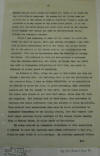
|
2.
17 January 1927.
Letter of protest from
Leon Frank, Bluefields, to US
Consul A. J. McConnico, Bluefields, p.
2. "
. . . amount desired that I would not
permit the vessel to be taken for any
revolutionary purposes. My reason for
not giving bond requested was as the
vessel is used in coastwise trade, I
would not guarantee what may happen to
any other coast points, as it was known
that the Power Barges and other boats
owned by the Cuyamel Fruit Company were
seized and used by Constitutional forces
without the company’s consent. ¶ While I
was preparing to send for the vessel the
civil war broke out anew in August,
1926, and shortly afterward I was
notified by local authorities that as
the vessel was at Rio Grande Bar in the
service of the Sacasa forces, her
Matriculation was canceled. This was an
instruction from the Minister of Foreign
Relations. You informed me that you had
received a radiogram from the American
Minister, Mr. South, of Panama that the
UNION was held by Panamanian Authorities
at that time, and would be released on
proper proof of ownership. ¶ On October
2, 1926, after the port of Bluefields
had been declared a Neutral Zone, and
believing that we had the protection of
our American Navy, I sent my sloop
FERNANDINA, at an expenditure of $400.00
to Bocas del Toro, to prove ownership,
make seaworthy repairs and tow the
vessel to this port. Due to heavy
weather the boats were forced to put
into Port Limon, Costa Rica for food and
supplies. Not finding fuel at Port
Limon, they proceeded to Colorado Bar
where sufficient fuel was secured to
reach Bluefields. Upon arrival here
accusations were made by local
authorities to Commander Richardson of
the Landing forces, that the vessels
left Fort Limon carrying thirty soldiers
of the Sacasa forces landing them at
Monkey Point, 20 miles south of
Bluefields. ¶ On being advised by
Commander Richardson of this accusation
I offered to have the Captains made
sworn affidavits before you, which he
said would be satisfactory. My captains
appeared before . . . "
|
|
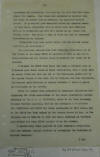
|
3.
17 January 1927.
Letter of protest from
Leon Frank, Bluefields, to US
Consul A. J. McConnico, Bluefields, p.
3. "
. . . you making the affidavits, that
none but the crew left Port Limon aboard
the vessels. When these were presented
he received them but would not accept
them as evidence, and requested further
records. At my request your Consulate
cabled the American Consul at Port
Limon, requesting that he secure from
Port officials data as to the passengers
and crew that sailed on the vessel when
leaving there. This reply, a copy of
which was sent to Commander Richardson,
was as follows: ¶ FERNANDINA LEFT HERE
TOWING UNION, CREW OF SIX MEN ABOARD
EACH BOAT, NO PASSENGERS. ¶ In a
previous conversation with Commander
Richardson, as to the status of the
sloop UNION he informed me that as she
had no matriculation she was totally
American property and could not be
touched. ¶ I brought the UNION from
Bocas del Toro, a friendly port to a
Neutral port under American Naval
Authorities, when I could just as easily
taken her into any one of the Nicaraguan
ports held by the Sacasa forces at the
time, but by bringing her into
Bluefields, the Neutral port declared by
Admiral Latimer, I tried to prove my
neutrality in the matter. ¶ After the
proofs were presented to Commander
Richardson disapproving the false
accusations of the local authorities
Captain Townsend of the U.S.S.
GALVESTON, wrote to the then Governor,
General Gustavo Arguello, that he was
convinced that neither the FERNANDINA
nor UNION had taken passengers at Port
Limon, but as the UNION had been seized
by the Sacasa forces in May, he the
Governor was at liberty to take the
boat, although no truthful accusations
had been filed against me or the vessel.
¶ I immediately filed protest at your
Consulate requesting that you address
Admiral Latimer to reconsider the
decision of Captain Townsend."
|
|
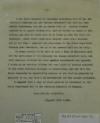
|
4.
17 January 1927.
Letter of protest from
Leon Frank, Bluefields, to US
Consul A. J. McConnico, Bluefields, p.
4. "
. . . I was later informed by Commander
Richardson that it was the Admiral’s
decision and not Captain Townsend’s and
that he, Commander Richardson, was not
in accord with it. Admiral Latimer
replied to my appeal though you, that he
washed his hands of the matter, and that
it would have to be taken up with the
State Department. About eight weeks have
elapsed since above occurred, and at
this time I appealed for protection to
the State Department through your
Consulate, and up to the present have
had no reply. ¶ It seems strange to be
that we have a Navy in Nicaragua only
for the protection of the Mahogany and
Banana interests here, and that American
citizens who have similar investments
are ignored. I claim as an American
citizen the same right of justice
accorded to any other American citizen
or corporation, and ask that the Naval
Commander be immediately ordered to see
that my property is returned to me, and
that I be indemnified for any losses
sustained. ¶ I request that a copy of
above protest be forwarded to the State
Department and to the American Minister
at Managua. ¶ Respectfully submitted, ¶
(Signed) LEON FRANK"
|
|
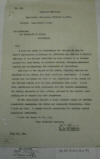
|
5 February
1927.
Letter from US
Consul A. J. McConnico,
Bluefields, to Secretary of State,
Washington D.C., re case of Leon Frank.
"SIR:
¶ I have the honor to acknowledge the
receipt of Department’s Instructions of
January 16, 1927 (File No. 317.113 B
521/15) relating to the charges
submitted by Rear Admiral J. L. Latimer
against Mr. Leon Frank, an American
citizen, alleging unneutral conduct and
recommending the withdraw of protection.
¶ The copy of the report that Lt. McGee,
alleging serious admissions by Mr.
Frank, has been carefully considered. I
cannot accept his statements in view of
the assertions of Mr. Frank and the
British Consul that no such admissions
were made. I have full confidence in
both gentlemen; but the reports
concerning Lt. McGee, received at this
office, are not to his credit,
compelling me to regard him with
suspicion. ¶ If the Department desires I
shall forward copies of written
complaints concerning Lt. McGee and
Commander Richardson, which I have on
file. I cannot recall accurately the
various verbal complaints submitted. ¶ I
have this honor to be, Sir, ¶ Your
obedient servant ¶ A. J. McConnico ¶
American Consul."
|
|
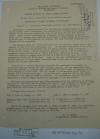
|
11 February
1927.
"Unfavorable Mahogany Prospects In
Nicaragua," Special Circular No. 1009,
J. C. Nellis,
Acting Chief, Lumber Division, Bureau of
Foreign & Domestic Commerce, Dept. of
Commerce, Washington D.C., to all firms
on Exporter's Index handling mahogany,
from information provided by US Consul
A. J. McConnico, Bluefields.
"According
to reports received from the various
mahogany companies operating in the
eastern part of Nicaragua, the prospects
for a normal yield during the ensuing
season are more unfavorable than at any
time for the past thirteen years. Under
normal conditions the shipments average
annually 15,000,000 board feet of
mahogany and 3,000,000 board feet of
cedar valued at $1,000,000. If 60
percent of that quantity is obtained
this year the more optimistic exporters
will be surprised. ¶ The mahogany year,
for those connected with the industry,
begins July 1 and extends to June 30 of
the succeeding year. The greater
proportion of the shipments is made
during the December and the March
quarters owing to seasonal floods on the
rivers. It is during the December
quarter that the exporting companies
engage contractors to obtain specified
quantities of logs. Such contractor
agrees to supply from 500,000 to
1,500,000 board feet, the total
aggregating 26,000,000 board feet. Owing
to the many difficulties encountered in
the business it is not usual that more
than 75 percent of the quantity
contracted for reaches tide water. ¶
Conditions in eastern Nicaragua
prevented the exporters from making the
customary contracts during the past
December quarter, and the unsettled
conditions that prevail at present have
caused them to limit their obligations
in the way of supplying contractors. The
dry season in the mahogany areas begins
in January and continues until May. It
is then that trees are felled and rolled
or hauled to the nearest creek or
rivulet. The contracts cannot therefore
expect but a limited output during the
remainder of the dry season. ¶ Although
many difficulties have been encountered
by the operators in floating the logs to
tide water and in placing them aboard
ocean steamers at eastern ports of
Nicaragua, the quantities shipped from
July 1, 1926 to January 1, 1927 compare
favorably with those of the
corresponding period of last year. ¶ A
comparative statement follows: ¶ July 1,
1925 to January 31, 1926. Mahogany,
board feet, 11,199,029--$920,938, Cedar,
board feet, 1,262,311--$105,375 ¶ July
1, 1926 to January 31, 1927. Mahogany,
board feet, 10,914,033--$845,742, Cedar,
board feet, 429,478--$58,633 ¶ During
the mahogany year from July 1, 1925, to
June 30, 1926, the quantities shipped
were: 16,037,355 board feet of mahogany
valued at $1,313,061, and 2,705,919
board feet of cedar valued at $202,888.
¶ J. C. Nellis, ¶ Acting Chief, Lumber
Division"
|
|
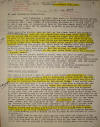
|
25 February
1927.
Letter from Guido
Grossmann, Bluefields, to C.
Schweinitz, Bethlehem PA, p. 1.
[Moravian Archives, Box 62, Nicaragua
Prov. Board Minutes 1927-31]
"My
dear Brother de Schweinitz:- ¶ Last
Wednesday I landed here again in
Bluefields. With various mishappenings
and disappointments, gasoline boat
accidents and contra wind on sea, so
that I was instead of four hours, 24
hours in a little boat out on sea. I was
able to complete my task of visiting
Tasba pouni and Karawala and now I will
try to continue to write to you about
what I saw on the various places. ¶
Tasba pouni: The station here as well as
the place itself has suffered but
little, except that all the plantations
have been eaten empty and, as the people
had to feed beside themselves about 1500
soldiers and as many of the Spanish
soldiers go to war, just as in the olden
times our people used to do it, with
their wives and children so that added
quite a large number more feeders to the
Tasba pouni people. The great General
Moncada credited the people for their
work of charity with this great
compliment: “if it would not have been
for you Tasba pouni people, we would
never had been able to win the victory
at Pearl Lagoon.” And: “if we finally
triumph in our just cause Tasba pouni
will receive a special reward.” ¶ It
will take the people sometime until they
are able to have provision in their
plantations and therefore at present
they are very poor. ¶ The Church which
was used as a hospital has to be
painted, the school house as well as the
teachers house have been somewhat
damaged, and the people would be very
thankful if they could receive some
help. ¶ Otherwise the spiritual work of
Tasba pouni is growing steadily, and it
was indeed a pleasure to me to be with
them for a few days. ¶ Great River and
Karawala: ¶ From here I am sorry I have
to send a sad report. Sr. Bregenzer is
sick, and according to my opinion she is
completely broken down. If she does not
leave the country soon, for a thorough
change, I am afraid she will not be able
to continue the service in the mission
field. I was really surprised to see
her, and I do not think that I saw ever
a sister who has changed and fallen off
so rapidly under the influence of the
climate than Sr. Bregenzer. I was told
by Brother Bregenzer that the slightest
little excitement gives her sleepless
nights, for instance he continued: “we
are glad that you came but it will mean
a few nights without sleep for my wife.”
Something had to be done. She herself
thinks that she ought to go home to see
a doctor, as she also has some trouble
with the womb since she gave birth to
the last child. But I do not think that
this is the cause of her general
debility and nervousness. Sr. Bregenzer
has been always anemic and the influence
of the climate here has just increased
her trouble. It may also have been
increased by not taking proper care of
herself. When she came to this land,
she, in spite of my protest, was washing
clothes and cooking and doing all kind
of things what a woman ought not to do
in this climate, and if she does it is
injuring herself, but unfortunately
quite a number of the sisters do not
believe it until they feel it. ¶ I have
asked them to ask for furlough, but they
have not given me a definite answer, as
they first desire to have a clear and
definite answer from the Lord what to
do. I just mention this to you dear Bro.
de Schweinitz, so in case they do ask
for a vacation to the States, that you
might be . . ."
|
|
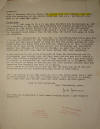
|
25 February
1927.
Letter from Guido
Grossmann, Bluefields, to C.
Schweinitz, Bethlehem PA, p. 2.
[Moravian Archives, Box 62, Nicaragua
Prov. Board Minutes 1927-31]
"
. . . prepared. ¶ Here in Karawala and
Rio Grande the people have not suffered
very much, with the exception of our
church which was used as a barrack. It
will have to be repainted again. ¶
Bluefields: ¶ I just came in time to see
Miss Stafford and Heidenreich go off for
a vacation to San Jose. Miss Stafford
has injured herself with ball playing
and the doctor advised her to take a
rest. So Bro. Denneberger decided to
give to the Junior High School as month
vacation, so that the two teachers could
take a trip to San Jose. Of course this
goes on their own expenses. ¶ Bro.
Denneberger is doing well in Bluefields.
Especially glad was I to see the
Stortz’s so very interested in their
work. It is a pleasure to hear how the
people speak of them and how the people
appreciate their service. They are doing
very good work and especially in this
time, where there is so much bitter
feeling against the foreigners and
especially against the citizens of the
United States. I am glad that they are
in Bluefields and that they show by
their action that they unpartial. ¶ Sr.
Heidenreich is not quite well, both of
them Bro. Heidenreich and Sr.
Heidenreich are looking worn out. They
have had and are still having a hard
time with this congregation and I hope
that my visit may have helped in some
way to straighten out various matters.
True he is different from all of us, yet
he means it earnest, and our best
members realize this and therefore are
thankful for what he is doing. ¶ But it
seems to me that he is too old for the
work and if he had not Sr. Heidenreich
as his assistant, things would be even
worse. ¶ Now I am anxious to go home
again, it is today three weeks that I
left my family. Monday I will take a
vessel which will bring me to Bilway,
and I hope when this letter come into
your hand, I am home again. ¶ With my
best greetings ¶ very fraternally yours,
¶ From Bro. and Sr. Hamilton I have
heard nothing since I left them at
Bragman’s."
|
|
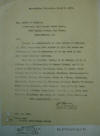
|
9 March
1927.
Letter from US
Consul A. J. McConnico,
Bluefields, to Mr. Albert F. Hopkins,
Secretary, Full Gospel Tract Depot,
Philadelphia PA.
[NOTE:
Includes names and addresses of all
missionaries in the Bluefields Consular
District:] "Revds. W.
H. Hooper, D. H. B. Miller, C. A.
Heidenreich, C. Conrad Shimer, H. H.
Stortz of Bluefields, Nicaragua; Revd.
F. Wolff, Pearl Lagoon, Nicaragua; K.
Bregenzer, Karawala, Nicaragua; Revd. J.
Fisher, Twappi, Nicaragua; Revd. N.
Wilson, Quamwalta, Nicaragua; Right
Revd. G. Grossman, Bragmans Bluff,
Nicaragua; Revd. K. C. Hamilton, Cabo
Gracias, Care of W. H. Seat; Revd. F. E.
Schramm, Sangsangta, care of W. H. Seat,
Cabo Gracias, Nicaragua; and Revd. J.
Palmer, Yulu, Nicaragua."
|
|
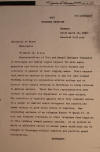
|
18 March
1927.
Letter from US Minister C.
Eberhardt, Managua, to Secretary
of State, Washington D.C.
"Representatives
of Otis and Mengel Mahogany Companies in
Nicaragua are making urgent request for
more ample guarantee and better
protection for their workmen and
interests in general in their logging
camps. Their request that American
marines be detailed to man the lake
steamer VICTORIA working in conjunction
with the railway and to protect their
supply stations in Chontales is being
referred to Admiral Latimer. Their New
York representatives seem certain to
approach the Department on the same
subject. The condition of banditry
against which they complain exists on a
larger or smaller scale throughout the
country and seems certain to grow worse
before it improves. See concluding
sentence of my telegram Number 77 March
17, 10 a.m. and frequent reference in
other telegrams from Legation to this
tendency toward general anarchy. In my
opinion no early or effective return to
normal peace conditions can be brought
to Nicaragua without complete and
positive armed intervention. ¶
EBERHARDT."
|
|

|
30 March
1927.
Radiogram from
Otis Manufacturing Company and S. B.
Vrooman Company, Bluefields, to
US Consul A. J. McConnico, Bluefields.
"Doctor Sandoval proposes through our
contractor not molest mahogany
operations Escondido district provided
Diaz forces make same agreement. Can you
obtain Diaz consent to this? Can you
have Diaz instruct Governor Araña
appoint representative to confer with
Doctor Sandoval and representative
mahogany companies in Rama to sign such
agreement witnessed by naval officer.
Diaz and Liberal forces have both
plundered mahogany camps this section.
Very essential secure this guarantee
from both factions or our losses will be
enormous."
|
|
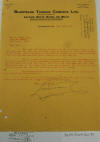
|
30 March
1927.
Letter from Leon
Frank, Bluefields Tanning
Company, to US Consul A. J. McConnico,
Bluefields.
"Dear Sir:- ¶ For
your information and as a matter of
record, I beg to advise you that this
morning an armed squad of sailors of the
landing forces of USS Denver, under
command of commander S.A. LaBounty, and
without any previous notice, searched
the tannery belonging to our company. ¶
When I learnt of the occurrence I went
to the American Headquarters and was
informed by Junior Lieutenant Greaselose
that they were searching for arms and
that none were found. I was also told
that they had been a denouncement made
to the effect that arms were hidden at
the tannery and that the Nicaraguan who
made the denouncement was under arrest.
¶ The Nicaraguan who made the
denouncement has no standing and is
without any respectability. ¶ I give you
all this information to show you that it
is their intention to molest me in any
and every way possible. ¶ Yours very
truly,"
|
|
PREVIOUS
next
|
|
|
|
|
|
|
|
